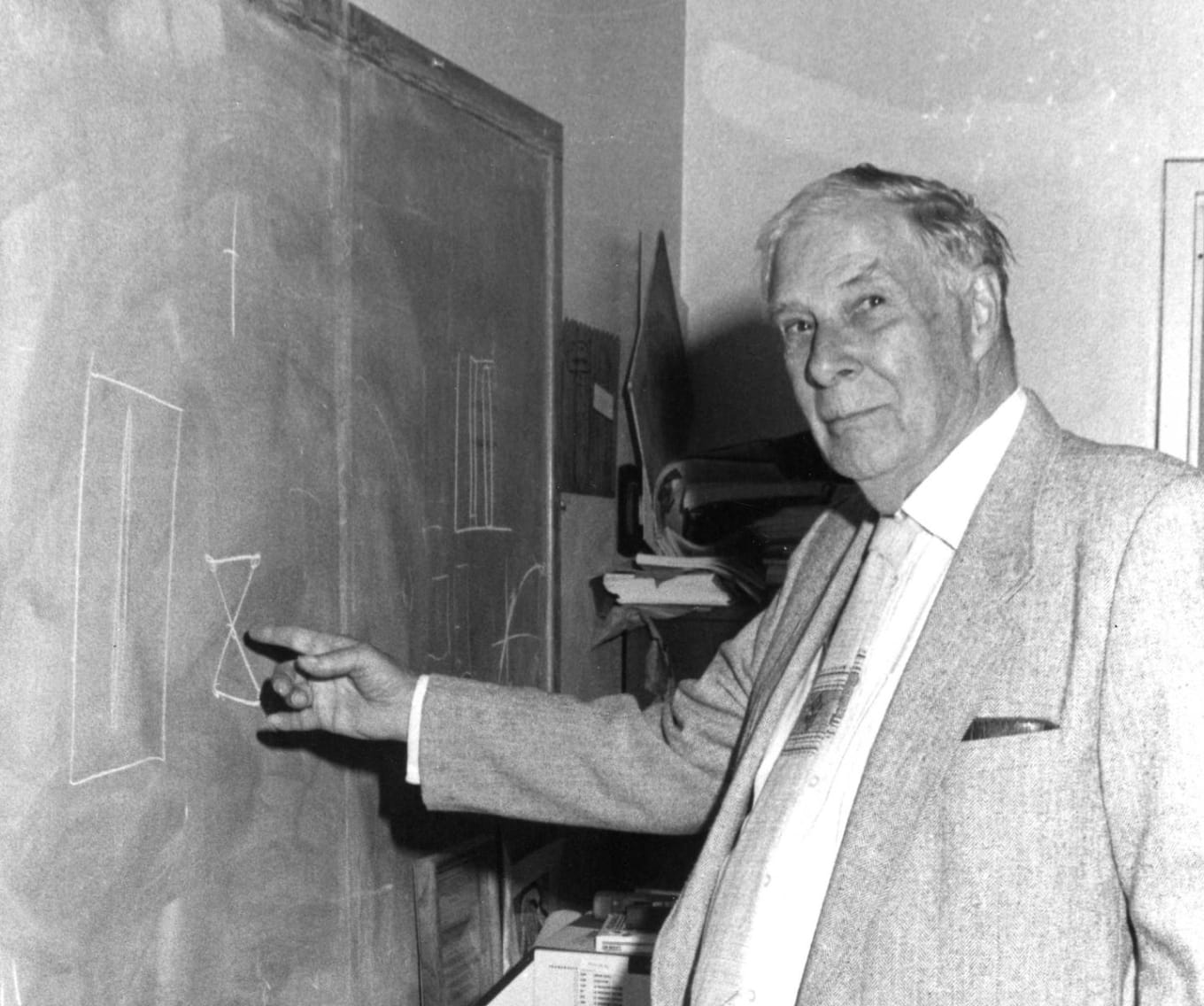Table of Contents
Video: Hamming, Learning to Learn: You and Your Research, 6 June 1995
By far, the most impactful thing I watched this month was this video from Richard Hamming, an American mathematician whose work helped advance the fields of computer engineering and telecommunications.

Source: A.M. Turing Awards
This video marks the end of a lecture series Hamming gave to the Naval Postgraduate School. In it, Hamming discusses:
- The importance of spending one's time doing significant work
- Spending time in meaningful ways
- How to choose important things to work on
As far as I know, and as far as you know, you have one life to lead. You might as well lead a life you would like to have. I would suggest leading a life of doing something significant.
Richard Hamming
You don't need to be a computer scientist or mathematician to find inspiration in what Hamming offers.
Article: 103 Bits of Advice I Wish I Had Known
This article by Kevin Kelly, co-founder of Wired magazine, provides countless bits of life advice that resonate with me.
The consistency of your endeavors (exercise, companionship, work) is more important than the quantity. Nothing beats small things done every day, which is way more important than what you do occasionally.
Kevin Kelly
Article: An Olympic Trainer Shares His Top Secrets for Pushing Through Discomfort
Last month, I shared a podcast I'd listened to called The Growth Equation, hosted by Brad Stulberg and Steve Magness. This month, I read a great article from Steve sharing his top advice for managing and pushing through discomfort.
Anything that makes you feel uncomfortable is an opportunity to desensitize the alarm in your brain. It’s not the discomfort that matters, it’s how you respond to it.
Steve Magness
As I've rebooted my freelancing career, I'm striving to pay closer attention to my levels of comfort and discomfort. I want to be comfortable enough so I'm not overwhelmed and anxious but uncomfortable enough to encourage growth—i.e., focusing on desirable difficulties.
I'm also improving my ability to manage discomfort so I can navigate difficult situations with greater ease and satisfaction.
Article: Make Free Stuff
I enjoyed Max Böck's thoughts on making free stuff. The ethos of publicly sharing on the internet helped fuel my interest in web development in the mid-2000s. [1]
Giving something away for free—that is, "gifting"—promotes a culture of abundance, not scarcity.
Giving something away for free is a gift to the world.
I want to do more gifting.
Article: Exiting the Vampire Castle
This essay by Mark Fisher is prescient, given our fractured societal landscape. It's me vs. you; left vs. right; correct vs. incorrect, as we fight for our beliefs and ideals in our polarizing world.
Lost in the fervent battle for our ideals is our need for building solidarity and comradeship between different groups of people to achieve common goals.
Effecting change on society and politics happens when citizens align around common interests.
Moralistic browbeating and reactionary "canceling" impede solidarity and reinforce a punitive moral framework.

Source: Art Institute Chicago
Let's focus on working-class solidarity and collective class consciousness.
Let's work together where we can.
We can't agree on everything, but that's life.
Who wants to build a coalition?
Article: eyeo wins landmark copyright court decision; protects digital rights and sets important legal precedent for who ‘owns’ HTML
This court ruling between eyeo and Axel Springer is interesting. eyeo is a developer in ad-filtering technology. Axel Springer is a multimedia conglomerate that owns Business Insider, Morning Brew newsletter, et al.
This court case revolved around who "owns" the underlying code for things distributed across the internet (e.g., websites, email).
When you receive your Morning Brew newsletter, who owns the underlying code for that email once it's in your inbox—you or Axel Springer?
When you view an article on Business Insider, does Axel Springer own the underlying code for that article after it's on your web browser?
Seemingly tricky questions. Who "owns" what in these scenarios?
The write-up from eyeo thoroughly sums it up:
While the website HTML copyright protections sought by the plaintiff appear innocent on the surface, the technical ramifications are onerous and dangerous.
In practice, most of the modern browser features that the Internet ecosystem enjoys today would have become instantly illegal, and copyright sanctions would have become enforceable: all privacy and anti-tracking technologies; all website language translation features; all accessibility utilities for blind and handicapped readers; all ad blockers; and all CSS modifications of any kind.
The burden would have fallen upon code developers and ordinary users to seek explicit permission from a website publisher to grant an exception to run their browser features — before visiting each and every website.
I own the code in my possession for this website as it exists (i.e., files and folders on my computer). However, once you open a web page I share on the internet publicly and it's on your computer, I no longer own it.
Podcast: Fail Better: Embracing Failure
I've listened to yet another fantastic episode of Command Line Heroes about embracing failure.
Embracing failure isn't easy, but it's inevitable. Something will eventually go wrong. That's just life.
Failure is inevitable, but you never want to fail the same way twice.
Given this inevitability, planning for perfection is unrealistic and unhelpful.
If we embrace the inevitability of failure, we can prepare ourselves to handle it in a healthy way that helps us learn and grow.
Something that's helped me handle failure is keeping a tight feedback loop between identifying a problem and addressing the problem.
When noticing an area of improvement, I try to consider whether I should take the time to make the improvement at that moment, rather than put it on the back burner.
I've got too many "improvements" on the back burner as it is 😅
Book: Anything You Want
I've enjoyed reading Derek Sivers' blog for a long time. I enjoy his approachability, honesty, and down-to-earth writing style.
To support his writing, and my own learning, I recently purchased hardcover copies of his books Anything You Want, Hell Yeah or No, and How to Live.
In Anything You Want, Sivers shares his tales of building and selling CD Baby. Being a chronic business creator, I find his tales inspiring.
When you make [a business] a dream come true for yourself, it'll be a dream come true for someone else, too.
Hooray capitalism!
Book: How to Live
As the title suggests, this book contains Sivers' scattered and often-contradicting thoughts on how to live.
Reading the first few pages got me thinking about commitment…
By fully committing to something, we remove ourselves from participating in the never-ending desire for better alternatives.
You can wonder whether the grass will be greener, or you can fully invest in what you have and where you're at.
You'll probably "save time" by investing in where you're at, unless that grass is really green.
Book: Hell Yeah or No
Hell Yeah or No contains Sivers' thoughts on what's worth doing.
How do you decide what's worth doing?
I have no idea how I decide. It feels like I'm throwing darts at a dartboard most of the time.
I like Sivers' "Hell Yeah" heuristic. If I don't respond with "Hell yeah!" when deciding to do something, that indicates it may not be worth doing.
What would I spend my time doing if I didn't worry about money, fame, renown, attention, and approval?
Book: The Icarus Deception
I'm continuing to work through The Icarus Deception, which I started in April.
The opportunity isn't in being momentarily popular to the anonymous masses, it's in being missed when you're gone and doing work that matters for the tribe that you choose.
Who do you want your customers/consumers/readers to change after interacting with you, your art, or whatever you've created?
Footnotes
I've long admired folks like Chris at CSS-Tricks or Collis Ta'eed at tuts+ (formerly Nettuts), who dedicated so much time to sharing their knowledge and experience. ↩︎